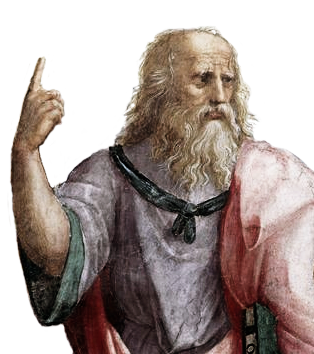
The Academy (Ancient Greek: Ἀκαδημία, romanized: Akadēmía), variously known as Plato's Academy, the Platonic Academy, and the Academic School, was founded at Athens by Plato circa 387 BC. Aristotle studied there for twenty years (367–347 BC) before founding his own school, the Lyceum. The Academy persisted throughout the Hellenistic period as a skeptical school, until coming to an end after the death of Philo of Larissa in 83 BC. The Platonic Academy was destroyed by the Roman dictator Sulla in 86 BC.[1]
A neo-Platonic academy was later founded in Athens that claimed to continue the tradition of Plato's Academy. This academy was shut down by Justinian in 529 AD, when some of the scholars fled to Harran, where the study of classical texts continued. In 1462 Cosimo de' Medici established the Platonic Academy of Florence, which helped initiate the Renaissance. In 1926 the Academy of Athens was founded with founding principle tracing back to the historical Academy of Plato.
History[edit]
The Akademia was a school outside the city walls of ancient Athens. It was located in or beside a grove of olive trees[2] dedicated to the goddess Athena, which was on the site even before Cimon enclosed the precincts with a wall,[3] and was called Academia after its original owner, Academus, an Attic hero in Greek mythology.[4][5] Academus was said to have saved Athens from attack by Sparta, revealing where Helen of Troy was hidden, when she had been kidnapped by King Theseus years before the incidents of the later Trojan War. Having thus spared Athens a war (or at least delayed it), Academus was seen as a savior of Athens. His land, six stadia (a total of about one kilometre, or a half mile; the exact length of a stadion varied) north of Athens, became revered even by neighboring city-states, escaping destruction during the many local wars.
The site of the Academy was sacred to Athena; it had sheltered her religious cult since the Bronze Age. The site was perhaps also associated with the twin hero-gods Castor and Polydeuces (the Dioscuri), since the hero Akademos associated with the site was credited with revealing to the brothers where the abductor Theseus had hidden their sister Helen. Out of respect for its long tradition and its association with the Dioscuri – who were patron gods of Sparta – the Spartan army would not ravage these original "groves of Academe" when they invaded Attica.[6] Their piety was not shared by the Roman Sulla, who had the sacred olive trees of Athena cut down in 86 BC to build siege engines.
Among the religious observances that took place at the Akademeia was a torchlit night race from altars within the city to Prometheus' altar in the Akademeia. The road to Akademeia was lined with the gravestones of Athenians, and funeral games also took place in the area as well as a Dionysiac procession from Athens to the Hekademeia and then back to the city.[7][8]
Modern times[edit]
The site was rediscovered in the twentieth century, in the modern Akadimia Platonos neighbourhood; considerable excavation has been accomplished and visiting the site is free.[42] The site of the Academy[43] is located near Colonus, approximately 1.5 kilometres (0.93 mi) north of Athens' Dipylon gates.[44]
Visitors today can visit the archaeological site of the Academy located on either side of the Cratylus street in the area of Colonos and Plato's Academy (Postal Code GR 10442). On either side of the Cratylus street are important monuments, including the Sacred House Geometric Era, the Gymnasium (first century BC – first century AD), the Proto-Helladic Vaulted House and the Peristyle Building (fourth century BC), which is perhaps the only major building that belonged to the actual Academy of Plato.